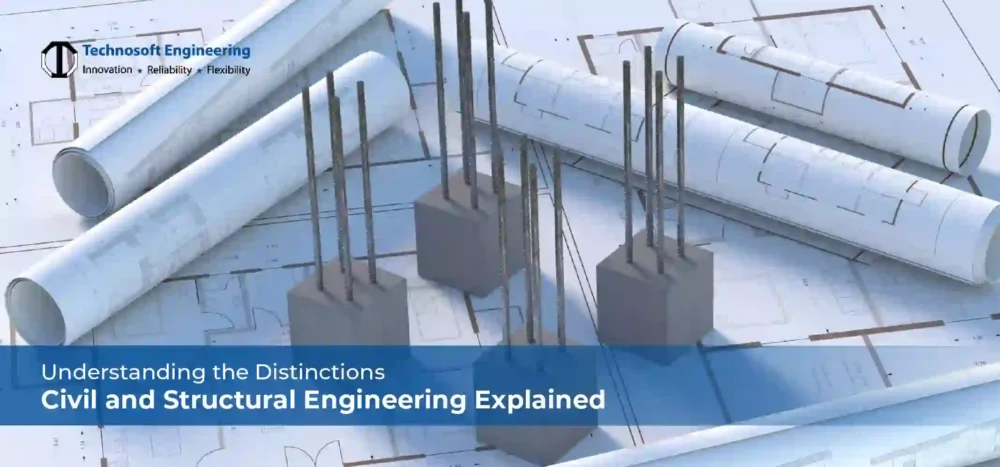
Civil and structural engineering are two closely associated disciplines within the engineering field, yet they have different roles and responsibilities. Understanding these differences is important for those considering a career in engineering or have clients seeking the appropriate expertise for their projects.
Civil Engineering: A Broad Overview
Civil engineering is a huge field that encompasses the design, construction, and maintenance of infrastructure projects. These all projects include roads, bridges, dams, water supply systems, et. Civil engineers are responsible for planning, transportation engineering, municipal or urban engineering, and water resources engineering.
Structural Engineering: A Specialized Discipline
Structural engineering is a special branch in civil engineering that focuses on the analysis of design of load-bearing structures. Structural engineers make sure that buildings, bridges, towers, and structures can withstand different kinds of forces and stresses, including weight, wind, and seismic activity. Their main role is to make sure there is robust safety, stability, and durability of these structures.
Key Differences Between Civil and Structural Engineering
1. Scope of Work
Civil Engineers: Engage in a broad range of infrastructure, such as transportation systems, water treatment facilities, urban development, etc. So, their work often includes coordinating multiple disciplines to make sure the successful completion of complex projects.
Structural Engineers: They are usually known to specifically focus on the structural integrity of buildings or other structures. They work to analyze and design structural elements to make sure they can support the required loads.
2. Focus Areas
Civil Engineers: They address different aspects of the infrastructure development, including environmental impact, sustainability, as well as public safety. They mostly work on projects that need a wholesome understanding of how different systems interact in a region.
Structural Engineers: These engineers specialize in the mechanics of structures that focus on materials, load calculations, and the effects of external forces. Expertise of these engineers are crucial in ensuring safety and functionality of the structure.
3. Collaboration
Structural engineering is a subset of civil engineering; therefore, both the disciplines often collaborate on projects. Civil engineers might outline the generic requirements that are needed for a project, but structural engineers offer detailed designs that make sure structural integrity. This collab ensures that infrastructure projects are safe.
4. Education and Training
Both civil and structural engineers are known to hold the civil engineering degrees. However, structural engineers often take up more specialized training or complete certifications to focus on structural analysis and design. Therefore, specialized training makes these engineers capable with special skills that tackle complex structural difficulties.
5. Employment Sectors
Civil Engineers: They are often employed by government firms, construction agencies, and consulting companies that work on public infrastructure projects. Basically, their work affects different aspects of day to day life from water supply to transportation.
Structural Engineers: Commonly work for certain top architectural companies and consulting firms, focusing on the structural fundamentals of any building or constructions and assessing existing constructions.
Interconnection with Other Engineering Disciplines
The basic difference between civil and structural engineering is equal to the differences that are observed in other fields of engineering like Industrial Design and Mechanical Engineering difference. Just like how industrial design focuses on product aesthetics as well as user experience while mechanical engineering emphasizes on functionality and its performance. Civil engineering has a broad approach to infrastructure, but structural engineering perfects the structural capability of any buildings or structures. Therefore, recognizing these specializations helps to pick the right professionals for specific projects.
Conclusion
Now we know how civil and structural engineering are interconnected, they serve different aspects in the construction sectors. Civil engineers always work to provide a huge perspective on infrastructure development. However, structural engineers work to offer special expertise that ensures safety of the individual structures. Recognizing such differences is essential for anyone involved in construction and engineering projects.
At Technosoft Engineering, we work to understand the important roles of both civil and structural engineers in several successful projects. We are backed up with a team of experienced professionals equipped for handling various challenges that ensures that your projects that are innovatively and structurally sound. Connect with us today to learn how we can assist you in bringing your vision to life.